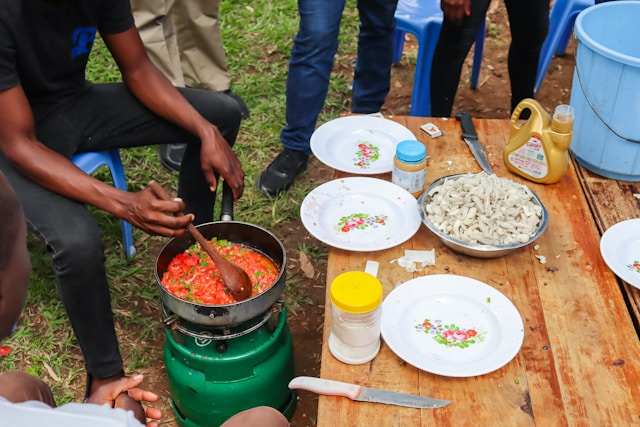10 Common Health Mistakes Young Nigerians Make (and How to Avoid Them)
Nigerian youths are energetic, ambitious, and often on the move. Between school, work, side hustles, and social life, health sometimes takes a back seat. Unfortunately, many of the habits people see as normal — skipping meals, using painkillers without prescriptions, staying up all night on phones, or relying on energy drinks — can quietly destroy long-term health.
Here are ten common health mistakes young Nigerians make and simple, affordable ways to avoid them. These tips will help you live stronger, think sharper, and enjoy a healthier lifestyle.
1. Self-Medication and Misuse of Antibiotics
Buying drugs from a roadside chemist or using leftover medication is a serious problem in Nigeria. Many young people take painkillers or antibiotics for every headache or fever without proper diagnosis. This can lead to **antibiotic resistance**, kidney damage, or delayed treatment of real illnesses like typhoid or malaria.
Always visit a clinic or pharmacy run by a licensed health professional. A short consultation can save you from a lifetime of complications.
2. Ignoring Regular Medical Checkups
Many Nigerians only visit hospitals when they are seriously ill. Regular health checks help detect conditions like high blood pressure, diabetes, or anaemia early — long before symptoms appear. Even if you feel fine, check your vitals once or twice a year. Some hospitals offer affordable packages for young adults.
3. Poor Sleep Habits
Between late-night movies, social media scrolling, and study marathons, most youths hardly sleep enough. Yet, sleep is not a luxury — it’s a biological necessity. Sleep deprivation affects your memory, immune system, and emotional balance.
Try to maintain a consistent sleep schedule. Switch off your phone 30 minutes before bed, use dim lighting, and avoid caffeine after 6 p.m. Quality sleep can improve your academic and work performance more than you imagine.
4. Unhealthy Diet and Over-reliance on Junk Food
Fast food and soft drinks are popular among students and young workers because they are quick and cheap. However, frequent consumption of fried snacks, sugary drinks, and processed meals increases the risk of obesity, heart disease, and ulcers.
Replace sugary drinks with water or fresh juice, eat more vegetables and fruits, and include foods rich in fibre like beans and whole grains. In the long run, healthy eating saves money spent on hospital bills.
5. Dehydration and Low Water Intake
Lagos heat or classroom stress can make anyone tired — but many young people forget to drink water. Energy drinks and soda are poor substitutes. Dehydration causes headaches, dizziness, and even mood swings.
Keep a water bottle with you and refill it regularly. A simple trick is to take a few sips every hour or after each class or task. Your body and skin will thank you.
6. Sedentary Lifestyle and Lack of Exercise
Long hours of sitting — during lectures, office work, or scrolling on phones — can harm your posture and metabolism. The body was built to move.
You don’t need an expensive gym membership. Walking short distances, stretching during breaks, or doing home workouts on YouTube make a big difference.
Regular exercise reduces stress, improves sleep, and keeps your mind sharp — all essential for young professionals and students.
7. Poor Sexual and Reproductive Health Awareness
Many Nigerian youths still find it uncomfortable to discuss sexual health. As a result, misinformation spreads quickly, leading to risky behaviour, untreated infections, and unwanted pregnancies.
Always use protection, get tested regularly, and seek professional advice if you notice unusual symptoms. Clinics and NGOs offer confidential counselling — don’t rely on myths from friends or social media.
8. Neglecting Mental Health
Depression, anxiety, and burnout are rising among Nigerian youths, but stigma keeps many silent. Constant stress from academic pressure, financial struggles, or unemployment can lead to emotional exhaustion.
Mental health is just as important as physical health. Talk to someone you trust, seek counselling, or take breaks when overwhelmed. Practising self-care and prayer or meditation can also help maintain inner peace.
9. Poor Personal Hygiene and Unsafe Water Practices
In hostels or crowded apartments, hygiene is often neglected. Sharing towels, using dirty toilets, or eating with unwashed hands exposes you to infections like typhoid and cholera.
Wash your hands regularly, bathe daily, and drink only clean, treated water. If you live off-campus, boil or filter your water before drinking.
Good hygiene is a simple but powerful way to protect your health and confidence.
10. Overuse of Energy Drinks and Stimulants
Many young Nigerians rely on energy drinks or excessive coffee to stay awake for studies or night shifts. These drinks can increase heart rate, cause anxiety, and disrupt sleep patterns.
Instead of depending on stimulants, take short naps, stretch, or eat fruits for natural energy. Long-term overuse of caffeine can lead to fatigue, headaches, and dehydration.
Bonus: Ignoring Health Education Opportunities
Many schools, NGOs, and media outlets share free health information — yet most youths scroll past or ignore them. Staying informed about nutrition, sexual health, and first aid can save lives.
Read verified health articles from trusted platforms like World Health Organization (WHO) and the Nigeria Centre for Disease Control (NCDC).
You can also explore Alphayem Health for reliable updates and local health education articles.
Final Thoughts
Good health doesn’t come from expensive diets or supplements — it comes from consistent healthy habits. By correcting these common mistakes, young Nigerians can prevent many future illnesses, save money, and live more productive lives.
Remember, your body is your first investment; take care of it before chasing other goals.
Internal links: Read more on Alphayem Health:
The Health Dangers of Self-Medication in Nigeria and
The Health Dangers of Constant Phone Use Before Bedtime.


人生多艰,快乐一天是一天!